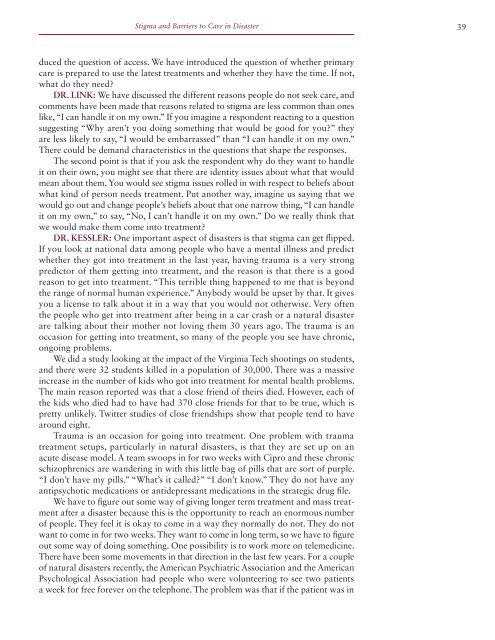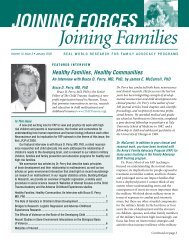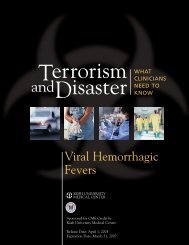stigma and barriers to care - Uniformed Services University of the ...
stigma and barriers to care - Uniformed Services University of the ...
stigma and barriers to care - Uniformed Services University of the ...
You also want an ePaper? Increase the reach of your titles
YUMPU automatically turns print PDFs into web optimized ePapers that Google loves.
Stigma <strong>and</strong> Barriers <strong>to</strong> Care in Disaster 39<br />
duced <strong>the</strong> question <strong>of</strong> access. We have introduced <strong>the</strong> question <strong>of</strong> whe<strong>the</strong>r primary<br />
<strong>care</strong> is prepared <strong>to</strong> use <strong>the</strong> latest treatments <strong>and</strong> whe<strong>the</strong>r <strong>the</strong>y have <strong>the</strong> time. If not,<br />
what do <strong>the</strong>y need<br />
DR. LINK: We have discussed <strong>the</strong> different reasons people do not seek <strong>care</strong>, <strong>and</strong><br />
comments have been made that reasons related <strong>to</strong> <strong>stigma</strong> are less common than ones<br />
like, “I can h<strong>and</strong>le it on my own.” If you imagine a respondent reacting <strong>to</strong> a question<br />
suggesting “Why aren’t you doing something that would be good for you” <strong>the</strong>y<br />
are less likely <strong>to</strong> say, “I would be embarrassed” than “I can h<strong>and</strong>le it on my own.”<br />
There could be dem<strong>and</strong> characteristics in <strong>the</strong> questions that shape <strong>the</strong> responses.<br />
The second point is that if you ask <strong>the</strong> respondent why do <strong>the</strong>y want <strong>to</strong> h<strong>and</strong>le<br />
it on <strong>the</strong>ir own, you might see that <strong>the</strong>re are identity issues about what that would<br />
mean about <strong>the</strong>m. You would see <strong>stigma</strong> issues rolled in with respect <strong>to</strong> beliefs about<br />
what kind <strong>of</strong> person needs treatment. Put ano<strong>the</strong>r way, imagine us saying that we<br />
would go out <strong>and</strong> change people’s beliefs about that one narrow thing, “I can h<strong>and</strong>le<br />
it on my own,” <strong>to</strong> say, “No, I can’t h<strong>and</strong>le it on my own.” Do we really think that<br />
we would make <strong>the</strong>m come in<strong>to</strong> treatment<br />
DR. KESSLER: One important aspect <strong>of</strong> disasters is that <strong>stigma</strong> can get flipped.<br />
If you look at national data among people who have a mental illness <strong>and</strong> predict<br />
whe<strong>the</strong>r <strong>the</strong>y got in<strong>to</strong> treatment in <strong>the</strong> last year, having trauma is a very strong<br />
predic<strong>to</strong>r <strong>of</strong> <strong>the</strong>m getting in<strong>to</strong> treatment, <strong>and</strong> <strong>the</strong> reason is that <strong>the</strong>re is a good<br />
reason <strong>to</strong> get in<strong>to</strong> treatment. “This terrible thing happened <strong>to</strong> me that is beyond<br />
<strong>the</strong> range <strong>of</strong> normal human experience.” Anybody would be upset by that. It gives<br />
you a license <strong>to</strong> talk about it in a way that you would not o<strong>the</strong>rwise. Very <strong>of</strong>ten<br />
<strong>the</strong> people who get in<strong>to</strong> treatment after being in a car crash or a natural disaster<br />
are talking about <strong>the</strong>ir mo<strong>the</strong>r not loving <strong>the</strong>m 30 years ago. The trauma is an<br />
occasion for getting in<strong>to</strong> treatment, so many <strong>of</strong> <strong>the</strong> people you see have chronic,<br />
ongoing problems.<br />
We did a study looking at <strong>the</strong> impact <strong>of</strong> <strong>the</strong> Virginia Tech shootings on students,<br />
<strong>and</strong> <strong>the</strong>re were 32 students killed in a population <strong>of</strong> 30,000. There was a massive<br />
increase in <strong>the</strong> number <strong>of</strong> kids who got in<strong>to</strong> treatment for mental health problems.<br />
The main reason reported was that a close friend <strong>of</strong> <strong>the</strong>irs died. However, each <strong>of</strong><br />
<strong>the</strong> kids who died had <strong>to</strong> have had 370 close friends for that <strong>to</strong> be true, which is<br />
pretty unlikely. Twitter studies <strong>of</strong> close friendships show that people tend <strong>to</strong> have<br />
around eight.<br />
Trauma is an occasion for going in<strong>to</strong> treatment. One problem with trauma<br />
treatment setups, particularly in natural disasters, is that <strong>the</strong>y are set up on an<br />
acute disease model. A team swoops in for two weeks with Cipro <strong>and</strong> <strong>the</strong>se chronic<br />
schizophrenics are w<strong>and</strong>ering in with this little bag <strong>of</strong> pills that are sort <strong>of</strong> purple.<br />
“I don’t have my pills.” “What’s it called” “I don’t know.” They do not have any<br />
antipsychotic medications or antidepressant medications in <strong>the</strong> strategic drug file.<br />
We have <strong>to</strong> figure out some way <strong>of</strong> giving longer term treatment <strong>and</strong> mass treatment<br />
after a disaster because this is <strong>the</strong> opportunity <strong>to</strong> reach an enormous number<br />
<strong>of</strong> people. They feel it is okay <strong>to</strong> come in a way <strong>the</strong>y normally do not. They do not<br />
want <strong>to</strong> come in for two weeks. They want <strong>to</strong> come in long term, so we have <strong>to</strong> figure<br />
out some way <strong>of</strong> doing something. One possibility is <strong>to</strong> work more on telemedicine.<br />
There have been some movements in that direction in <strong>the</strong> last few years. For a couple<br />
<strong>of</strong> natural disasters recently, <strong>the</strong> American Psychiatric Association <strong>and</strong> <strong>the</strong> American<br />
Psychological Association had people who were volunteering <strong>to</strong> see two patients<br />
a week for free forever on <strong>the</strong> telephone. The problem was that if <strong>the</strong> patient was in




